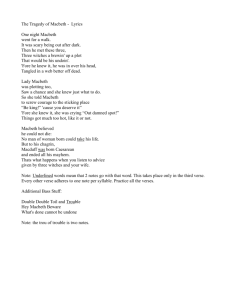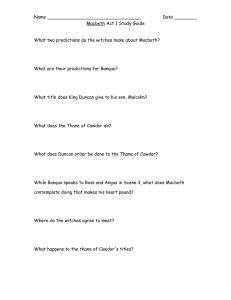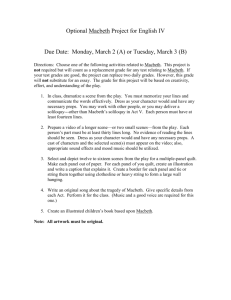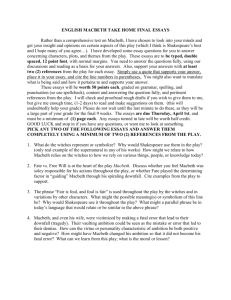File
advertisement
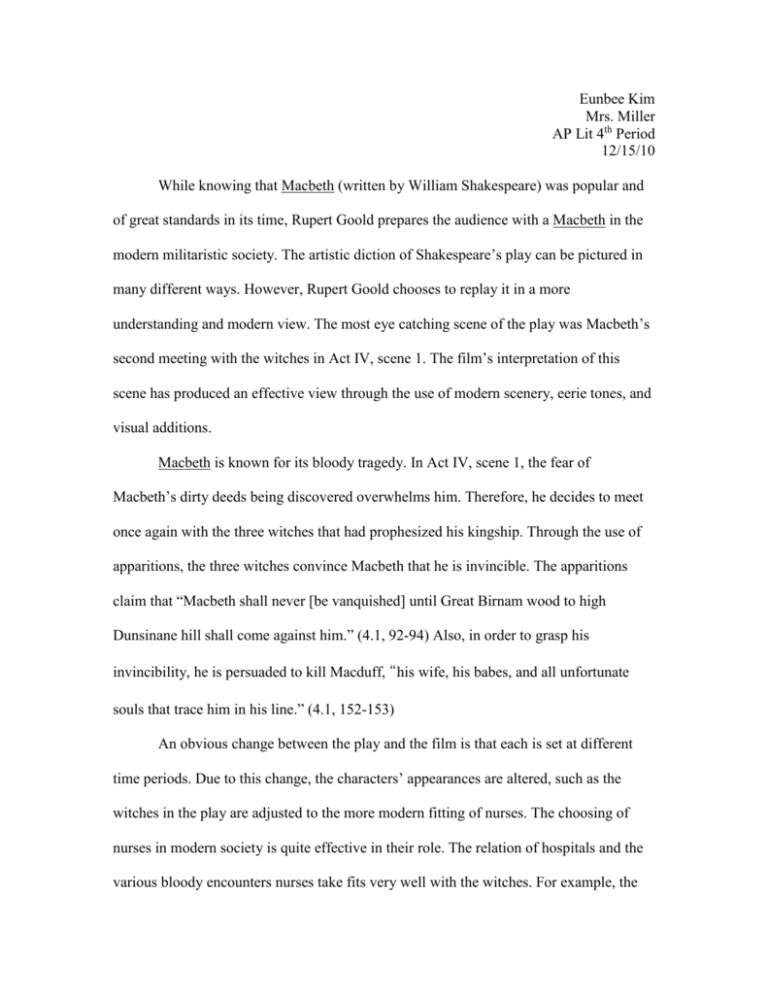
Eunbee Kim Mrs. Miller AP Lit 4th Period 12/15/10 While knowing that Macbeth (written by William Shakespeare) was popular and of great standards in its time, Rupert Goold prepares the audience with a Macbeth in the modern militaristic society. The artistic diction of Shakespeare’s play can be pictured in many different ways. However, Rupert Goold chooses to replay it in a more understanding and modern view. The most eye catching scene of the play was Macbeth’s second meeting with the witches in Act IV, scene 1. The film’s interpretation of this scene has produced an effective view through the use of modern scenery, eerie tones, and visual additions. Macbeth is known for its bloody tragedy. In Act IV, scene 1, the fear of Macbeth’s dirty deeds being discovered overwhelms him. Therefore, he decides to meet once again with the three witches that had prophesized his kingship. Through the use of apparitions, the three witches convince Macbeth that he is invincible. The apparitions claim that “Macbeth shall never [be vanquished] until Great Birnam wood to high Dunsinane hill shall come against him.” (4.1, 92-94) Also, in order to grasp his invincibility, he is persuaded to kill Macduff, “his wife, his babes, and all unfortunate souls that trace him in his line.” (4.1, 152-153) An obvious change between the play and the film is that each is set at different time periods. Due to this change, the characters’ appearances are altered, such as the witches in the play are adjusted to the more modern fitting of nurses. The choosing of nurses in modern society is quite effective in their role. The relation of hospitals and the various bloody encounters nurses take fits very well with the witches. For example, the witches have their language of “sow’s blood” and their relation to the apparitions that speak of being “bloody.” Also, due to the character change, the tone is set differently. In the play, the use of witches provides an automatic untrustworthy and evil tone. On the other hand, the movie uses nurses, which could bring a more questionable reliability. This questionable reliability leads into a suspenseful plot that introduces a thrill into the play. Adding on to the intensity and eerie sensation, the sound and lighting enhanced the view of the witches. The beating of a defibrillator in the background reminds the audience of death, which is in a huge relation to the play in general. Unlike a spell being cast, the movie uses demonic voices that are played by the witches and the corpses instead of the apparitions. The corpses provide a stronger visual than the apparitions because they are like bodies being possessed by the witches’ “masters.” The lighting is dark and murky, but creates a spotlight on the witches when they speak. This emphasizes the power of the witches and how all attention is driven to the speaker. Throughout the scene is a strange feeling that has “harp’d [Macbeth’s] fear.” The visual of the movie in general brings the audience to a closer view to the events occurring. As the witches secretively move around the corpses, Macbeth enters the room questioning the “secret, black and midnight hags” on what they do. This is able to be seen more clearly in the movie by dramatic irony, in which Macbeth doesn’t know of their deeds and the audience does. The appearances of the eight kings are important to the scene in providing the many lines of Banquo’s sons as kings. With the movie, the actual disgust and fear is shown on Macbeth’s face as he entitles the vision as a “horrible sight.” Therefore, the movie adds on to further describe the characters’ actions. Though Macbeth was written in a form that could be described in many views, Rupert Goold successfully combined the universal thoughts to bring out a just as good movie. He uses modern scenery, eerie tones, and visual additions to keep the meeting between the witches and Macbeth frightening and intimidating. The script was powerful by itself, but was even more compelling in the movie. In other words, it brings the words of imagination from your mind onto the screen.
